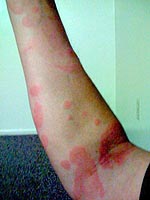Skin Rashes

Urticaria
This allergy closely resembles white blisters and red itchy patches. Acute, short-lasting attacks of urticaria are very common, affecting as many as one in five people.
If you are allergic to dogs, for instance, you will rapidly develop a red, itchy rash when licked on the face by a dog. When you are allergic to something you eat, you will get widespread urticaria rashes all over your body. You will get this rash if you are allergic to wasp and bee stings, and many medicines, particularly penicillin, are associated with widespread rashes.
Well-known causes, in addition to milk, egg and nuts, are fish, shellfish, beans, potatoes, strawberries, celery, parsley and spices.
A skin prick test is used to discover the offending allergen.
Antihistamine is used to relieve the symptoms. However, finding a permanent cure means finding the allergen and avoiding it.
Angio-oedema
Angio-oedema simply means a deep swelling in the tissue. It usually occurs in the face, tongue and larynx (voice box). This allergic reaction is caused by the effects of histamine released into the blood vessels. It is closely linked to urticaria and has similar effects.
The most common triggers are aspirin and non-steroidal anti-inflammatory drugs like ibuprofen. Occasionally, paracetamol can be the cause. Preservatives should also be avoided.
Swelling of the tongue and larynx cause increasing breathlessness and can be fatal if not treated rapidly with an injection of adrenalin.
Allergic Contact Dermatitis
This allergy is more common with advancing age and symptoms include redness, scaling and thickening of the skin, which itches when it has been in contact with the allergen.
Common allergens:
- Nickel: Clothing clasps, spectacle frames, jewelry, coins.
- Chromate: Leather, bleaches, matches, cement.
- Formaldehyde: Preservatives, cosmetics, nail varnish, news print, cigarettes, and fabric conditioners.
- Ethylene diamine: Preservatives in creams, paint.
- Thiurams: Rubber products, fungicides in paint and soap.
- Plants: Primula, poison ivy, dahlias.
- Latex: Balloons, rubber gloves, condoms.
Reactions to the above-mentioned allergens vary from contact dermatitis to asthma, anaphylaxis and even death.
People with allergies must always wear medic alert bracelets, which could prove life saving.
|